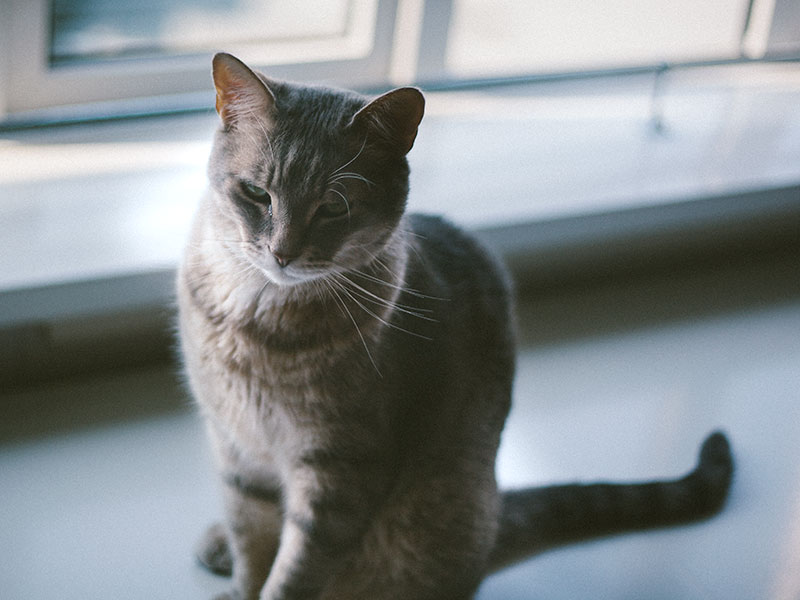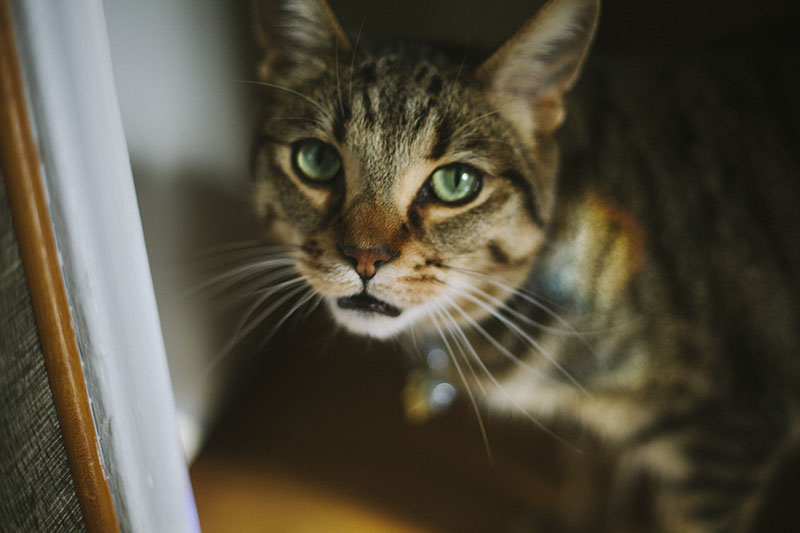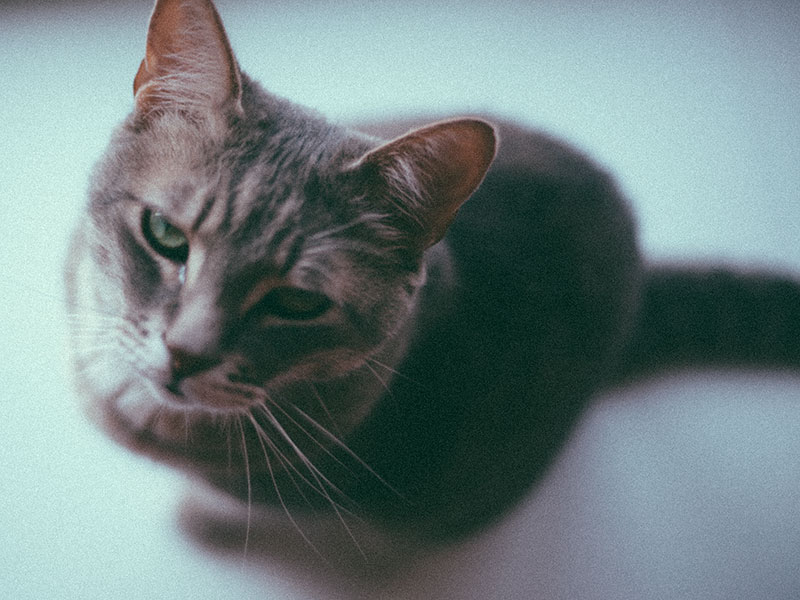If you’ve ever lived with a cat before, you’re likely to already be aware of how very similar they can be behaviourally to humans at times. Cats yawn, cats snore; like many of us – they enjoy routines, enjoy snoozing one heck of a lot, and when they want something, they even somehow manage to sound like they’re crying when they meow.
But can cats really cry? And if they can – what types of things would they cry over? Why do cats sometimes get teary? Are felines ever emotionally driven to cry tears of sadness like human beings? If not, what do cat tears mean instead?
I’ll be breaking down these topics in today’s article. Have theories or experiences with cats crying or cat tears? Please take a moment to share them with me in the comments section down below!

Quickly, Defining Crying
The Oxford English Dictionary defines the verb “cry” in relation to humans as: 1. “Shed tears, typically as an expression of distress, pain, or sorrow” and 2. “Shout or scream, typically to express fear, pain, or grief.”
Straight away by looking at this definition, you’ll see that crying is split into two. Part one is obviously about tearing up, water streaming out of our eye ducts onto our face. While part two is about a vocalization, miserably weeping, shouting or screaming, with or without words.
So let’s break this article down further, first by discussing whether cats can cry tears, then by discussing whether cats really cry vocally, like we humans do.
Can Cats Cry Tears?
Cats actually cannot cry tears like humans. Their eye ducts absolutely do water, but when you see cat tears welling up in a feline’s eyes, that reaction is always to something physical and is not ever emotional in nature.
Thus, when it comes to cats crying tears emotionally, which is, I do believe, what people mean when they ask if cats can cry tears, the answer is a resounding no. Emotional reactions and sadness cannot a teary cat make. But of course since cats can have tears, that leads us to the question…
What Do Cat Tears Mean?
Humans sometimes have tears in their eyes for physical reasons. Ever had an eyelash in your eye? A piece of dust or something else small creep onto your water line? Chances are your eyes welled up because of the foreign object.
Your human eyes can also tear up because of an allergy, infection, because they’re dry or due to any other type of irritant effecting them – like a particularly bright light or extremely dry air.
When cats tear up, it’s for much the same reasons: allergies, infections, and irritants. Which is why, if your cat is regularly tearing up, you should get him or her checked out at the vet immediately. Let the vet know your cats eyes have been welling up, how frequently, if it happens at a particular time or a in specific place, and any other information you think may be relevant. Your cat’s eyes may not only be the windows into his or her soul, in this case, they may also be the windows to his or her well being and overall health.
Easy-to-remedy culprits that could be leading a cat’s eyes to water include the use of harsh disinfectants, smelly sprays, perfumes, all those kinds of things. If you suspect a specific culprit, immediately eliminate it from your cat’s environment and see if the eye watering stops – but if it doesn’t, off to the vet in case there’s some sort of allergy or illness that needs to be remedied.
Do Cats Cry Vocally?
Absolutely cats cry vocally. There are many types of vocalizations cats can make, and even crying isn’t limited to just one.
It can be pretty difficult to talk about how specific vocalized cat cries sound. Some are described as yowls, wails, caterwauls, or just downright whines. But yes, cats cry vocally, and they do so for a variety of reasons.
Why Do Cats Vocally Cry?
Cats cry for a large variety of particular reasons that all can be summarized loosely into two types: “I want something” or “I’m not feeling well.”
The “I want something” can be broken down into ever-so-many different particulars – some general and some very specific: your cat could want food, attention, entertainment, exercise, company, or in terms of particulars, could want a door opened, a litter box cleaned, a chance to go outside, to draw your attention to insects, or a never-ending list of other things.
Arrived here because you’d like to know a bit more about your own cat’s crying? Figure out why your cat is crying by using this troubleshooting article here.

Do Different Cat Cry Vocalizations Mean Different Things? Can You Tell the Difference?
While I may be wrong, I don’t think that cat crying vocalizations from one cat to the next are exactly the same. My guess is that each cat’s “I want food” cry sounds a little different, especially since each cat’s regular meow is pretty unique.
I also think that cats can utilize an incredibly large number of different meows in their vocalizations, and that these may come about or change over time, depending on how your cat adapts to try to communicate with you.
My own cat, Avery, will use pretty much the same meow for everything besides a few particular things. He has what I call his “war cry” – which lets me know he’s hyper and ready to play this instant, as well as a little ever so annoying little meep-like whine he uses to slowly wake me up out of bed at night if he hadn’t got enough exercise during the day. He has a very annoying, “Give me cuddles now; it’s sunny, I’m resting and I want some petting” demanding cry, a slightly distinct, “I’m done with my afternoon nap and I want you to acknowledge my presence” cry, and then his typical, “I want food/attention” whine. I can absolutely tell the difference between these meows, and there may be more that I can’t yet tell the difference between, but I certainly think if I were to adopt a new cat, he or she would likely have and go about creating many different ones over time.
When it comes to pain, however, from my experience the cry that results is typically very different and quite distinct from others. This type of vocalized cat crying is far more distressed, urgent, and fraught with agony than any others, and if you recognize and hear that pained cry coming out of your cat, you’re likely to know in your gut something is immediately wrong.
Cats are frustrating creatures sometimes. If they’re in mild pain, you simply won’t be able to tell. They could cut themselves, have a mildly upset tummy for hours, have issues peeing for days – still you wouldn’t know until it hurts. By the time you hear the heart-wrenching pain yowl, something is typically really wrong, and needs to be addressed quickly.
Avery lets out this painful cat cry whenever he’s feeling terribly bad, and each and every time he’s used it thus far, he’s thrown up immediately after. It’s an absolutely heart-wrenching sound to hear, and it makes me automatically drop what I’m doing to run and comfort him. While it rarely happens, the first time it did I knew it was different. Now, I know exactly what it means (in Avery’s case, thus far it’s always meant he’s pushed too hard in the bathroom and is no longer feeling well – and needs to throw up to feel better). If the pain didn’t quickly resolve itself, and he continued to meow this cat cry for some time, I would know to rush him to the vet immediately for a diagnosis and relief.
It’s not always easy to tell when a cat is in pain, so even if you don’t suspect a cat’s crying is due to pain, if it’s frequent and regular, or not letting up and you even suspect your cat might be sick – you should absolutely take your cat to the vet to confirm there isn’t an issue. Again, if your cat is crying, please use this article to figure out why, so you can take further action and give your cat what he or she wants or needs.
But What About Sadness – Can Cats Cry Vocally Because They’re Sad?
It’s my firm belief that cats can and do truly feel sadness. Normally, not over an everyday occurrence or a melancholic mood, but over a great loss, like a family member or close friend, a human, another cat, or a dearly loved other-species of animal.
There are a number of different videos online that show cats mourning over the loss of dearly departed loved ones. While most of the time, cats don’t appear to vocally cry, and instead appear to do things like attempt to wake up or revive the departed, save them, lay down beside the lost loved one, even frantically dig at their graves, they do sometimes cry vocally over lost loved ones as well.
All in all, while it may not be the most common way for cats to show grief, vocalized crying certainly is a way cats can show they are sad.

Thoughts & Experiences With Cat Crying?
What have your experiences with cat crying been like?
Have your cats ever cried tears? What have been the reasons behind these tears?
Do your cats have different vocalized cries to communicate different types of things? Have you ever heard a pained cat cry? Did this sound immediately different to you and what ended up being wrong?
Looking forward to reading about your experiences below!

My cat cried tears and was panting and howling, when I had to put him in a cage, when I moved out of my parents house and into my first apartment. He did not like the car ride or being put into a cage. This situation was stressful for everyone involved and his reaction makes sense.
Poor thing 🙁
If you have some time to spare over the next few weeks, take a peek at my article on training cats to be happier in their cages and carriers. I find it’s really helpful to get rid of that fear they have over carriers because you do sometimes need to transport them (whether it’s moving or to visit a vet, or even during emergency situations like house fires – you sadly never know!).
I can definitely understand his reaction; it’s ridiculously painful to watch your pet so stressed, especially if it gets to the point of tears; even if it’s for something necessary like being transported to a new location.
When I had to give away the mom cat’s kittens, I couldn’t keep them all, she cried for about a week or two. It sounded like a person and also yowling. When one of the other cats finally died, she cried each time she got fed, waiting for him. This lasted for a few months.
So heartbreaking 🙁
I wish there was more of this cat mourning documented on video and posted online – I don’t feel enough people understand that cats can mourn.
What a really good blog! When my cats have what I call ‘weeping’ eyes it usually because they have become irritated. My normal reponse is to want to wipe them but they always clear up on their own. I also always now when one of my cats is about to through up a furball as she has what can only be described as a ‘yowl’ just before it happens.
I have also seen our cats react in a specific way when my partner (who is long term sick) is having a pretty rough day. They spend more time with him than usual and when he was in hospital and I was at home alone and crying, our eldest cat Sox came and sat with me until I stopped. When he returned she spent so much time with him and watches him constantly to make sure is OK. My family say I attribute too many human traits with those of my cats but in my experence they are closer to humans in terms of their feelings than many think!
That’s a good point about cat eyes clearing up very soon after becoming irritated – it’s very true based on my experience. I guess it can be seen as a tell that there’s likely no underlying condition, since once the irritation source is gone, the tears fade quickly.
That is too sweet about your cats keeping you guys company when sick or sad. I absolutely love cats who will do this, it’s actually so helpful and comforting. I have to agree with you – I do also think cats are much more similar to humans than most believe. I feel people don’t get cats right though – if you said the same about a dog, I doubt anyone would argue you’ve gone too far!
Sammy was a feral, and he always seemed jumpy, grumpy, and happy to just sit by himself. When I noticed one of his teeth was falling out, I managed to trap him and get him to the vet for a dental. The vet said that his mouth was ‘a mess’, and even if she managed to take care of all of his teeth problems, how was I going to administer antibiotics, then bring him back again in 10 days? We decided to euthanize him, and Sammy told me with his eyes that he was done with his body. I still feel guilty that I could have figured out how to care for him without teeth. He didn’t cry or show the obvious pain he was in. But my gut told me he wasn’t right for almost a year before, but what to do with a feral cat? Because of Sammy, I pay close attention to my feelings, because that’s how I communicate with my cats. Since they don’t always show their distress.
Oh my goodness – poor Sammy!! 🙁
I absolutely hate the fact that cats don’t show pain often – I feel it makes it so difficult for us to know when it’s time for a vet visit. There are so many signs that are ever-so-subtle, that most pet parents probably would think nothing of – like regular tooth grinding or running to litter box often, for instance.
It’s great that more people are aware these days, and the internet makes searching up symptoms a lot easier, but I do think intuition plays a huge role still, because sometimes, nothing really serious seems to present itself.
Still it’s hard, sometimes it’s easier to doubt your intuition because we’re often told as pet parents that nothing is wrong and we’re over-reacting when we feel something is off that vets don’t immediately know how to explain. So important to trust our instinct, though.